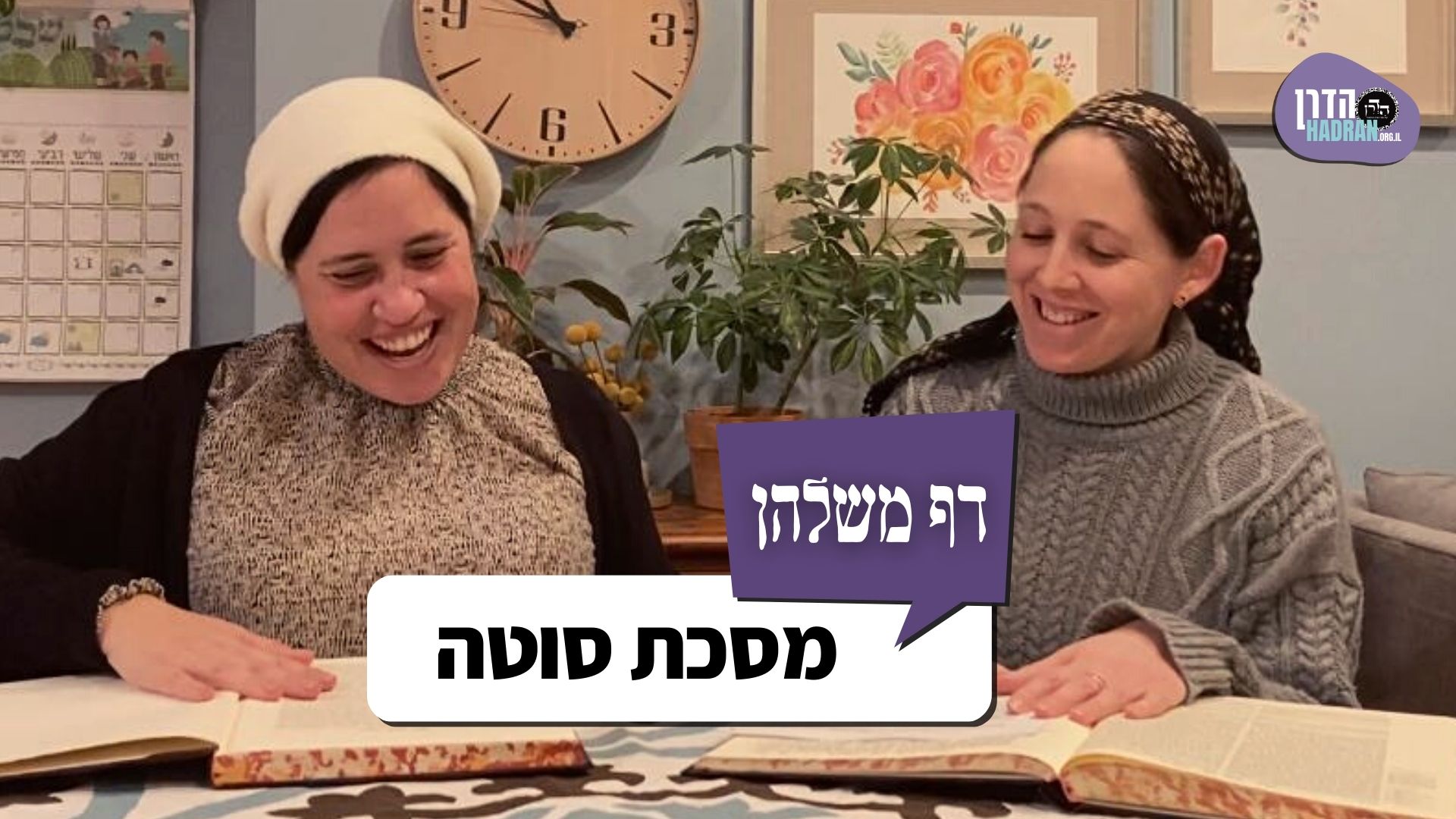סוטה מג
מוּנָּחִין בָּאָרוֹן. וְכֵן הוּא אוֹמֵר: ״וַיִּשְׁלַח אֹתָם מֹשֶׁה אֶלֶף לַמַּטֶּה לַצָּבָא אֹתָם וְאֶת פִּינְחָס״. ״אֹתָם״ — אֵלּוּ סַנְהֶדְרִין, ״פִּינְחָס״ — זֶה מְשׁוּחַ מִלְחָמָה, ״וּכְלֵי הַקֹּדֶשׁ״ — זֶה אָרוֹן וְלוּחוֹת שֶׁבּוֹ, ״וַחֲצֹצְרוֹת הַתְּרוּעָה״ — אֵלּוּ הַשּׁוֹפָרוֹת.
were resting in the Ark. And similarly, it says in the verse with regard to the war against Midian: “And Moses sent them, a thousand of every tribe, to the war, them and Pinehas the son of Elazar the priest, to the war, with the holy vessels and the trumpets for the alarm in his hand” (Numbers 31:6). The verse is interpreted as follows: “Them”; these are the Sanhedrin. “Pinehas”; he was the priest anointed for war. “And the holy vessels”; this is the Ark and the tablets that were within it. “And the trumpets for the alarm”; these are the shofarot.
תָּנָא: לֹא לְחִנָּם הָלַךְ פִּינְחָס לַמִּלְחָמָה, אֶלָּא לִיפָּרַע דִּין אֲבִי אִמּוֹ, שֶׁנֶּאֱמַר: ״וְהַמְּדָנִים מָכְרוּ אֹתוֹ אֶל מִצְרַיִם וְגוֹ׳״. לְמֵימְרָא דְּפִינְחָס מִיּוֹסֵף אָתֵי? וְהָא כְּתִיב: ״וְאֶלְעָזָר בֶּן אַהֲרֹן לָקַח לוֹ מִבְּנוֹת פּוּטִיאֵל לוֹ לְאִשָּׁה״. מַאי לָאו, דְּאָתֵי מִיִּתְרוֹ שֶׁפִּיטֵּם עֲגָלִים לַעֲבוֹדָה זָרָה? לָא, מִיּוֹסֵף שֶׁפִּיטְפֵּט בְּיִצְרוֹ.
A tanna taught: It was not for nothing that specifically Pinehas went to war with Midian; rather, it was to exact the rightful judgment of his mother’s father, Joseph, as it is stated: “And the Midianites sold him into Egypt to Potiphar, an officer of Pharaoh’s” (Genesis 37:36). The Gemara asks: Is this to say that Pinehas came, on his mother’s side, from the family of Joseph? But it is written: “And Elazar, Aaron’s son, took himself a wife from the daughters of Putiel; and she bore him Pinehas” (Exodus 6:25). What, is it not that Pinehas came from the family of Yitro, who was also called Putiel because he fattened [pittem] calves for idol worship? They answer: No; he was descended from Joseph, who mocked [pitpet] his desire by resisting the advances of Potiphar’s wife.
וַהֲלֹא שְׁבָטִים מְבַזִּין אוֹתוֹ: רְאִיתֶם בֶּן פּוּטִי זֶה, בֵּן שֶׁפִּיטֵּם אֲבִי אִמּוֹ עֲגָלִים לַעֲבוֹדָה זָרָה, יַהֲרוֹג נָשִׂיא מִיִּשְׂרָאֵל! אֶלָּא: אִי אֲבוּהּ דְּאִימֵּיהּ מִיּוֹסֵף — אִימֵּיהּ דְּאִימֵּיהּ מִיִּתְרוֹ, וְאִי אִימֵּיהּ דְּאִימֵּיהּ מִיּוֹסֵף — אֲבוּהּ דְּאִימֵּיהּ מִיִּתְרוֹ. דַּיְקָא נָמֵי, דִּכְתִיב: ״מִבְּנוֹת פּוּטִיאֵל״, תְּרֵי מַשְׁמַע. שְׁמַע מִינַּהּ.
The Gemara asks: But is it not the case that, according to an oral tradition, the tribes were denigrating Pinehas after he killed Zimri, saying: Did you see this son of Puti, the son whose mother’s father fattened cows for idol worship? Should this man kill a prince of Israel? Evidently, his grandfather Puti was Yitro, not Joseph. The Gemara answers: Rather, Pinehas was descended from both Joseph and Yitro. If his mother’s father descended from Joseph, his mother’s mother descended from Yitro. And if his mother’s mother descended from Joseph, his mother’s father descended from Yitro. The Gemara confirms this resolution: The language is also precise, as it is written: Elazar took a wife “from the daughters of Putiel,” which implies that she came from two daughters of men named Putiel. The Gemara concludes: You may learn from the verse that this is so.
מַתְנִי׳ ״וְדִבְּרוּ הַשֹּׁטְרִים אֶל הָעָם לֵאמֹר מִי הָאִישׁ אֲשֶׁר בָּנָה בַיִת חָדָשׁ וְלֹא חֲנָכוֹ יֵלֵךְ וְיָשֹׁב לְבֵיתוֹ וְגוֹ׳״. אֶחָד הַבּוֹנֶה בֵּית הַתֶּבֶן, בֵּית הַבָּקָר, בֵּית הָעֵצִים, בֵּית הָאוֹצָרוֹת. אֶחָד הַבּוֹנֶה, וְאֶחָד הַלּוֹקֵחַ, וְאֶחָד הַיּוֹרֵשׁ, וְאֶחָד שֶׁנִּתַּן לוֹ מַתָּנָה.
MISHNA: The mishna continues its discussion of the speech given before battle. “And the officers shall speak to the people, saying: What man is there that has built a new house, and has not dedicated it? Let him go and return to his house, lest he die in the battle, and another man dedicate it” (Deuteronomy 20:5). He is sent home if he is one who builds a storehouse for straw, a barn for cattle, a shed for wood, or a warehouse. Similarly, it applies if he is one who builds, or if he is one who purchases, or if he is one who inherits, or if he is one to whom it is given as a gift. In all these instances, the man returns from the war encampment.
״וּמִי הָאִישׁ אֲשֶׁר נָטַע כֶּרֶם וְלֹא חִלְּלוֹ וְגוֹ׳״ — אֶחָד הַנּוֹטֵעַ כֶּרֶם, וְאֶחָד הַנּוֹטֵעַ חֲמִשָּׁה אִילָנֵי מַאֲכָל, וַאֲפִילּוּ מֵחֲמֵשֶׁת הַמִּינִין. אֶחָד הַנּוֹטֵעַ, וְאֶחָד הַמַּבְרִיךְ וְאֶחָד הַמַּרְכִּיב, וְאֶחָד הַלּוֹקֵחַ, וְאֶחָד הַיּוֹרֵשׁ, וְאֶחָד שֶׁנִּתַּן לוֹ מַתָּנָה.
The next verse states: “And what man is there that has planted a vineyard, and has not used the fruit thereof? Let him go and return unto his house, lest he die in the battle and another man use the fruit thereof” (Deuteronomy 20:6). He is sent home if he is one who plants a whole vineyard of many vines, or if he is one who plants as few as five fruit trees of another variety, and even if these five are from the five species. The produce need not be all of one species. The same applies if he is one who plants, or if he is one who layers the vine, bending a branch into the ground so that it may take root and grow as a new vine, or if he is one who grafts different trees onto one another. And it applies if he is one who purchases a vineyard, or if he is one who inherits a vineyard, or if he is one to whom the vineyard is given as a gift.
״וּמִי הָאִישׁ אֲשֶׁר אֵרַשׂ אִשָּׁה וְגוֹ׳״, אֶחָד הַמְאָרֵס אֶת הַבְּתוּלָה, וְאֶחָד הַמְאָרֵס אֶת הָאַלְמָנָה. אֲפִילּוּ שׁוֹמֶרֶת יָבָם, וַאֲפִילּוּ שָׁמַע שֶׁמֵּת אָחִיו בַּמִּלְחָמָה — חוֹזֵר וּבָא לוֹ. כׇּל אֵלּוּ וָאֵלּוּ שׁוֹמְעִין דִּבְרֵי כֹּהֵן מַעַרְכֵי מִלְחָמָה, וְחוֹזְרִין. וּמְסַפְּקִין מַיִם וּמָזוֹן, וּמְתַקְּנִין אֶת הַדְּרָכִים.
The next verse states: “And what man is there that has betrothed a wife, and has not taken her? Let him go and return to his house, lest he die in the battle, and another man take her” (Deuteronomy 20:7). He is sent home if he is one who betroths a virgin, or if he is one who betroths a widow. This applies even if his yevama, his late brother’s wife, is a widow waiting for him as her yavam to perform levirate marriage; and even if he heard that his brother died in the war and the widow begins to wait for him only then, he returns and goes home. Each of these men, although they are exempt, still hear the address of the priest and the regulations of war at the local camp, and thereafter they return to their respective homes. However, they still support the war effort, and they provide water and food for the soldiers and repair the roads.
וְאֵלּוּ שֶׁאֵינָן חוֹזְרִין: הַבּוֹנֶה בֵּית שַׁעַר, אַכְסַדְרָה וּמִרְפֶּסֶת, הַנּוֹטֵעַ אַרְבָּעָ[ה] אִילָנֵי מַאֲכָל וַחֲמִשָּׁה אִילָנֵי סְרָק, הַמַּחֲזִיר אֶת גְּרוּשָׁתוֹ, אַלְמָנָה לְכֹהֵן גָּדוֹל, גְּרוּשָׁה וַחֲלוּצָה לְכֹהֵן הֶדְיוֹט, מַמְזֶרֶת וּנְתִינָה לְיִשְׂרָאֵל, בַּת יִשְׂרָאֵל לְמַמְזֵר וּלְנָתִין — לֹא הָיָה חוֹזֵר. רַבִּי יְהוּדָה אוֹמֵר: אַף הַבּוֹנֶה בַּיִת עַל מְכוֹנוֹ — לֹא הָיָה חוֹזֵר. רַבִּי אֱלִיעֶזֶר אוֹמֵר: אַף הַבּוֹנֶה בֵּית לְבֵינִים בַּשָּׁרוֹן — לֹא הָיָה חוֹזֵר.
And these are the men who do not return to their homes: One who builds a gateway, or an enclosed veranda [akhsadra], or a balcony; or one who plants no more than four fruit trees or even five or more non-fruit bearing trees; or one who remarries his divorced wife. Nor is there an exemption for one who has betrothed a woman whom he is not permitted to marry: With regard to a widow betrothed to a High Priest (see Leviticus 21:7); a divorcée or a yevama who performed ḥalitza [ḥalutza], in lieu of entering into a levirate marriage, betrothed to a common priest (see Leviticus 21:13–15); a mamzeret or a Gibeonite woman betrothed to an Israelite; or an Israelite woman betrothed to a mamzer or a Gibeonite (see Deuteronomy 23:3); such a man does not return to his home. Rabbi Yehuda says: Even one who rebuilds a house as it stood originally would not return. Rabbi Eliezer says: Even one who builds a new brick house in the Sharon would not return because these houses are not stable and are expected to collapse periodically.
אֵלּוּ שֶׁאֵין זָזִין מִמְּקוֹמָן: בָּנָה בַּיִת וַחֲנָכוֹ, נָטַע כֶּרֶם וְחִלְּלוֹ, הַנּוֹשֵׂא אֶת אֲרוּסָתוֹ, הַכּוֹנֵס אֶת יְבִמְתּוֹ, שֶׁנֶּאֱמַר: ״נָקִי יִהְיֶה לְבֵיתוֹ שָׁנָה אֶחָת״. ״לְבֵיתוֹ״ — זֶה בֵּיתוֹ, ״יִהְיֶה״ — זֶה כַּרְמוֹ, ״וְשִׂמַּח אֶת אִשְׁתּוֹ״ — זוֹ אִשְׁתּוֹ, ״אֲשֶׁר לָקָח״ — לְהָבִיא אֶת יְבִמְתּוֹ. אֵין מַסְפִּיקִין לָהֶם מַיִם וּמָזוֹן, וְאֵין מְתַקְּנִין אֶת הַדְּרָכִים.
These are the men who do not even move from their places because they do not even report to the camp: One who built a house and dedicated it within the year; one who planted a vineyard and used its fruit for less than a year; one who marries his betrothed and one who marries his yevama, his brother’s widow who must enter into a levirate marriage or perform ḥalitza, as it is stated: “When a man takes a new wife, he shall not go out with the army…he shall be free for his house one year, and shall cheer his wife whom he has taken” (Deuteronomy 24:5). The mishna interprets the verse as follows: “For his house”; this means his house that he built. “He shall be”; this term includes his vineyard. “And shall cheer his wife”; this is his wife. “Whom he has taken”; this phrase comes to include his yevama, who is considered his wife with respect to this halakha although he has not yet married her. Those who are exempt for these reasons do not even provide water and food to the soldiers, and they do not repair the roads.
גְּמָ׳ תָּנוּ רַבָּנַן: ״וְדִבְּרוּ הַשֹּׁטְרִים״, יָכוֹל דְּבָרִים שֶׁל עַצְמָן? כְּשֶׁהוּא אוֹמֵר ״וְיָסְפוּ הַשֹּׁטְרִים״ — הֲרֵי דְּבָרִים שֶׁל עַצְמָן אָמוּר, הָא מָה אֲנִי מְקַיֵּים ״וְדִבְּרוּ הַשֹּׁטְרִים״ — בְּדִבְרֵי מְשׁוּחַ מִלְחָמָה הַכָּתוּב מְדַבֵּר. הָא כֵּיצַד? — כֹּהֵן מְדַבֵּר וְשׁוֹטֵר מַשְׁמִיעַ.
GEMARA: The Sages taught: “And the officers shall speak…What man is there that has built a new house, and has not dedicated it? Let him go and return to his house, lest he die in the battle, and another man dedicate it” (Deuteronomy 20:5). One might have thought that they say their own words and that the priest does not issue these proclamations. However, when it says: “And the officers shall speak further” (Deuteronomy 20:8), their own words are mentioned only in this latter verse. Evidently, then, the priest is the speaker in the earlier verse. How then do I realize the meaning of: “And the officers shall speak” in the first verse? The verse is speaking of the words of the priest anointed for war. How so? The priest speaks in an undertone, and an officer calls out the priest’s words so that they are audible to the assembled.
תָּנֵי חֲדָא: כֹּהֵן מְדַבֵּר וְשׁוֹטֵר מַשְׁמִיעַ, וְתַנְיָא אִידַּךְ: כֹּהֵן מְדַבֵּר וְכֹהֵן מַשְׁמִיעַ, וְתַנְיָא אִידַּךְ: שׁוֹטֵר מְדַבֵּר וְשׁוֹטֵר מַשְׁמִיעַ. אָמַר אַבָּיֵי: הָא כֵּיצַד? מִ״וְּנִגַּשׁ״ וְעַד ״וְדִבְּרוּ״ — כֹּהֵן מְדַבֵּר וְכֹהֵן מַשְׁמִיעַ, מִ״וְּדִבְּרוּ״ עַד ״וְיָסְפוּ״ — כֹּהֵן מְדַבֵּר וְשׁוֹטֵר מַשְׁמִיעַ, מִ״וְּיָסְפוּ״ וְאֵילָךְ — שׁוֹטֵר מְדַבֵּר וְשׁוֹטֵר מַשְׁמִיעַ.
It is taught in one baraita: A priest speaks, and an officer calls out his words; and it is taught in another baraita: A priest speaks and a priest calls out. And it is taught in yet another baraita: An officer speaks and an officer calls out. Abaye said: How can these texts be reconciled? From the words: “That the priest shall approach” (Deuteronomy 20:2), until the words: “And the officers shall speak” (Deuteronomy 20:5), which consist of words of encouragement and inspiration, a priest speaks and another priest calls out. From the words “and the officers shall speak” until the words: “And the officers shall speak further” (Deuteronomy 20:8), which list various people who are to return home from the battle front because of happy occasions, a priest speaks and an officer calls out. From the words “and the officers shall speak further” and on, which address those who are fearful and fainthearted, an officer speaks and another officer calls out.
״מִי הָאִישׁ אֲשֶׁר בָּנָה בַיִת חָדָשׁ כּוּ׳״. תָּנוּ רַבָּנַן: ״אֲשֶׁר בָּנָה״, אֵין לִי אֶלָּא אֲשֶׁר בָּנָה. לָקַח וְיָרַשׁ וְנִיתַּן לוֹ בְּמַתָּנָה מִנַּיִן — תַּלְמוּד לוֹמַר: ״מִי הָאִישׁ אֲשֶׁר בָּנָה״.
§ The mishna teaches that the officers announce: “What man is there that has built a new house, and has not dedicated it? Let him go and return to his house, lest he die in the battle, and another man dedicate it” (Deuteronomy 20:5). The Sages taught: From the phrase “That has built,” I have derived only that this applies to one who has literally built a house. From where do I derive that it includes one who purchased, or inherited, or has been given a house as a gift? The verse states broadly: “What man is there that has built.” By not merely stating: One that has built, but using the expanded “what man is there that has built,” the verse includes any of these circumstances.
״בַּיִת״, אֵין לִי אֶלָּא בַּיִת. מִנַּיִן לְרַבּוֹת בֵּית הַתֶּבֶן, וּבֵית הַבָּקָר, וּבֵית הָעֵצִים, וּבֵית הָאוֹצָרוֹת — תַּלְמוּד לוֹמַר: ״אֲשֶׁר בָּנָה״, מִכׇּל מָקוֹם. יָכוֹל שֶׁאֲנִי מְרַבֶּה אַף הַבּוֹנֶה בֵּית שַׁעַר אַכְסַדְרָה וּמִרְפֶּסֶת, תַּלְמוּד לוֹמַר: ״בַּיִת״, מָה בַּיִת הָרָאוּי לְדִירָה — אַף כֹּל הָרָאוּי לְדִירָה.
From the term “a house” I have derived only a house in which people live. From where is it derived that the exemption is understood to also include one who builds a storehouse for straw, a barn for cattle, a shed for wood, or a warehouse? The verse states: “That has built,” which includes whatever one built, in any case. One might have thought that I should include even one who builds a gateway, or an enclosed veranda, or a balcony; however, the verse states: “A house,” which teaches that just as a house is, by definition, a structure that is fit for living, so too, this halakha applies to every structure that is potentially fit for living, although in practice it may be used for another purpose.
רַבִּי אֱלִיעֶזֶר בֶּן יַעֲקֹב אוֹמֵר: ״בַּיִת״ כְּמַשְׁמָעוֹ. ״לֹא חָנַךְ״, ״וְלֹא חֲנָכוֹ״ — פְּרָט לְגַזְלָן. לֵימָא דְּלָא כְּרַבִּי יוֹסֵי הַגְּלִילִי, דְּאִי רַבִּי יוֹסֵי הַגְּלִילִי הָא אָמַר: ״וְרַךְ הַלֵּבָב״, זֶה הַמִּתְיָירֵא
Rabbi Eliezer ben Ya’akov says: The word “house” is to be understood to mean, as it indicates, a building meant for human residence. With regard to the house for which a man may be sent back from the camp, since the verse does not state merely: “And has not dedicated,” but rather: “And has not dedicated it,” specifying the particular house to which the man is connected, the verse therefore excludes a robber who does not own his house. The Gemara asks: Shall we say that this opinion is not in accordance with the opinion of Rabbi Yosei HaGelili? As, if it were in accordance with the opinion of Rabbi Yosei HaGelili, didn’t he say: When the verse singles out the “fearful and fainthearted” (Deuteronomy 20:8), this is referring to one who is afraid
מֵעֲבֵירוֹת שֶׁבְּיָדוֹ!
because of sins that he has. According to this interpretation, one who stole another’s real estate should return home from war because of his guilt, which would seem to contradict the opinion of Rabbi Eliezer ben Ya’akov.
אֲפִילּוּ תֵּימָא רַבִּי יוֹסֵי הַגְּלִילִי, כְּגוֹן דַּעֲבַד תְּשׁוּבָה וִיהַב דְּמֵי. אִי הָכִי, הָוֵה לֵיהּ לוֹקֵחַ וְלֶיהְדַּר! כֵּיוָן דְּמֵעִיקָּרָא בְּתוֹרַת גְּזֵילָה אֲתָא לִידֵיהּ — לָא.
The Gemara answers: Even if you say that this ruling is in accordance with the opinion of Rabbi Yosei HaGelili, Rabbi Eliezer ben Ya’akov still needs to exclude one in possession of a stolen house, as in a case where one repented and gave money to the owners of the house that he stole. Although in such a case he is not considered a criminal, the house was originally stolen, and therefore he must remain among the military ranks. The Gemara challenges this: If so, i.e., he repaid the owners, he is now a legal purchaser of the house and he should return from the military ranks. The Gemara answers: Since initially it entered his possession with the status of stolen property, he does not return.
״וּמִי הָאִישׁ אֲשֶׁר נָטַע כֶּרֶם כּוּ׳״. תָּנוּ רַבָּנַן: ״אֲשֶׁר נָטַע״ — אֵין לִי אֶלָּא נָטַע. לָקַח וְיָרַשׁ וְנִיתַּן לוֹ בְּמַתָּנָה, מִנַּיִן — תַּלְמוּד לוֹמַר: ״וּמִי הָאִישׁ אֲשֶׁר נָטַע״.
§ The Gemara continues its discussion of those who return from the ranks. “And what man is there that has planted a vineyard, and has not used the fruit thereof” (Deuteronomy 20:6). The Sages taught: From the phrase “that has planted,” I have derived only that it applies to one who actually planted a vineyard. From where is it derived that the military exemption likewise includes one who purchased it, one who inherited it, and one to whom it was given as a gift? The verse states: “And what man is there that has planted.” By not merely stating: One that has planted, but using the expanded “what man is there that has planted,” the verse includes any of these circumstances.
״כֶּרֶם״ — אֵין לִי אֶלָּא כֶּרֶם, מִנַּיִן לְרַבּוֹת חֲמִשָּׁה אִילָנֵי מַאֲכָל וַאֲפִילּוּ מִשְּׁאָר מִינִין — תַּלְמוּד לוֹמַר: ״אֲשֶׁר נָטַע״. יָכוֹל שֶׁאֲנִי מְרַבֶּה הַנּוֹטֵעַ אַרְבָּעָה אִילָנֵי מַאֲכָל וַחֲמִשָּׁה אִילָנֵי סְרָק, תַּלְמוּד לוֹמַר: ״כֶּרֶם״.
From the specific term “vineyard,” I have derived only a vineyard; from where do I derive that it comes to include five fruit trees even from other species? The verse states: “That has planted,” to include different types of trees. Might I include even one who plants only four fruit trees and one who plants five or more non-fruit bearing trees? The verse states: “Vineyard.” The term excludes a quantity of trees that is too few to qualify as a vineyard, as well as trees that do not yield fruit at all.
רַבִּי אֱלִיעֶזֶר בֶּן יַעֲקֹב אוֹמֵר: ״כֶּרֶם״ כְּמַשְׁמָעוֹ. ״לֹא חִלֵּל״, ״וְלֹא חִלְּלוֹ״ — פְּרָט לְמַבְרִיךְ וּלְמַרְכִּיב. וְהָא אֲנַן תְּנַן: אֶחָד הַנּוֹטֵעַ וְאֶחָד הַמַּבְרִיךְ וְאֶחָד הַמַּרְכִּיב! אָמַר רַבִּי זֵירָא אָמַר רַב חִסְדָּא, לָא קַשְׁיָא: כָּאן בְּהַרְכָּבַת אִיסּוּר, כָּאן בְּהַרְכָּבַת הֶיתֵּר.
Rabbi Eliezer ben Ya’akov says: The word “vineyard” is to be understood as it indicates, and it is referring only to a grape vineyard. And since the verse does not state merely: “And has not used the fruit,” but rather: “And has not used the fruit thereof,” it excludes one who layers the vine or branch and one who grafts different trees onto one another. The Gemara asks: But didn’t we learn in the mishna: He is released if he is one who plants, or if he is one who layers, or if he is one who grafts trees? Rabbi Zeira said that Rav Ḥisda said: This is not difficult. Here, in the case where one does not return from the ranks, the man has performed forbidden grafting; there, in the case where one does return from the ranks, he has performed permitted grafting.
הַאי הַרְכָּבַת הֶיתֵּר הֵיכִי דָמֵי? אִילֵּימָא יַלְדָּה בְּיַלְדָּהּ — תִּיפּוֹק לֵיהּ דְּבָעֵי מֶיהְדָּר מִשּׁוּם יַלְדָּה רִאשׁוֹנָה! אֶלָּא יַלְדָּה בִּזְקֵינָה. וְהָאָמַר רַבִּי אֲבָהוּ: יַלְדָּה שֶׁסִּיבְּכָה בִּזְקֵינָה, בָּטְלָה יַלְדָּה בַּזְּקֵינָה, וְאֵין בָּהּ דִּין עׇרְלָה!
The Gemara asks: With regard to this permitted grafting, what are the circumstances? If we say that it is a young tree grafted together with another young tree, then let him derive the halakha that one must return from the ranks due to the first young tree. One should be exempt because of his first tree, which is young, and the grafted tree is irrelevant. Rather, it is a case in which a young tree is grafted with an old tree. The Gemara objects: But didn’t Rabbi Abbahu say: With regard to a young tree that was entangled, i.e., grafted, with an old tree, the young one is negated by the old one, and the law of orla does not apply to it. Therefore, the grafted tree should likewise lose its status as a young tree, and one in this situation should not return from the ranks.
אָמַר רַבִּי יִרְמְיָה: לְעוֹלָם יַלְדָּה בְּיַלְדָּה, וּכְגוֹן דִּנְטַע לְהָךְ קַמַּיְיתָא לִסְיָיג וּלְקוֹרוֹת. דִּתְנַן: הַנּוֹטֵעַ לִסְיָיג וּלְקוֹרוֹת — פָּטוּר מִן הָעׇרְלָה.
Rabbi Yirmeya said: Actually, one returns home if he grafts a young tree with another young tree, and it is a case in which he planted this first one for a fence or for beams, so that he is exempt from battle only because of the second tree, which he grafts for fruit. As we learned in a mishna (Orla 1:1): In a case of one who plants a tree for a fence or to yield wood for beams, the tree is exempt from the halakhot of orla.
וּמַאי שְׁנָא יַלְדָּה בִּזְקֵינָה דְּבָטְלָה, וּמַאי שְׁנָא יַלְדָּה בְּיַלְדָּה דְּלָא בָּטְלָה?
The Gemara asks: And what is different about the case of a young tree paired with an old tree such that the young tree is negated, and what is different about the case of a young tree being planted for fruit paired with a young tree planted for wood such that the fruit tree is not negated?
הָתָם אִי מִימְּלִיךְ עֲלַהּ — לָאו בַּת מֶיהְדָּר הִיא, הָכָא אִי מִימְּלִיךְ עֲלַהּ — בַּת מֶיהְדָּר הִיא [דְּהָא מֵעִיקָּרָא לְפֵירֵי קָיְימָא]. מִידֵּי דְּהָוֵה אַעָלוּ מֵאֵילֵיהֶן, דִּתְנַן: עָלוּ מֵאֵילֵיהֶן — חַיָּיבִין בְּעׇרְלָה.
The Gemara answers: There, in the case of an older tree, if one changes his mind about it and wants it to be a young tree obligated in orla, it cannot return to its previous state, as he has grafted it. Therefore, it is exempt from the halakhot of orla. Here, when a tree is planted for wood, if he changes his mind and decides to grow it for fruit, it can return to its default state of being planted for fruit, because initially it stands to be used for fruit. Therefore, it is not exempt from the halakhot of orla. This ruling is just as it is concerning trees that grew by themselves, which are subject to orla although they were not consciously planted for their fruit. As we learned in a mishna (Orla 1:2): Fruit trees that grew by themselves are obligated in orla although the landowner did not plant them himself.
וְלוֹקְמַהּ בְּכֶרֶם שֶׁל שְׁנֵי שׁוּתָּפִין, דְּהַאי הָדַר אַדִּידֵיהּ וְהַאי הָדַר אַדִּידֵיהּ? אָמַר רַב פָּפָּא, זֹאת אוֹמֶרֶת: כֶּרֶם שֶׁל שְׁנֵי שׁוּתָּפִין — אֵין חוֹזְרִין עָלָיו מֵעֶרְכֵי הַמִּלְחָמָה.
The Gemara asks: Why is there a need to establish the mishna as discussing a case where one planted the first tree for a fence or for beams? But let the mishna be established as referring to a vineyard belonging to two partners, where the two trees involved in the grafting were co-owned by partners, and both trees were young. As in this case this one man returns due to his tree and that other man returns due to his tree. Rav Pappa says: Since the Gemara avoids the scenario of the vineyard belonging to partners in favor of discussing a case where one planted the first tree for a fence or for beams, that is to say if there is a vineyard belonging to two partners, evidently they do not return for the vineyard from the ranks of soldiers waging war.
וּמַאי שְׁנָא מֵחֲמִשָּׁה אַחִין וּמֵת אֶחָד מֵהֶן בַּמִּלְחָמָה, דְּכוּלָּן חוֹזְרִין? הָתָם — כׇּל חַד וְחַד קָרֵינָא בֵּיהּ ״אִשְׁתּוֹ״, הָכָא — כׇּל חַד וְחַד לָא קָרֵינָא בַּיהּ ״כַּרְמוֹ״.
The Gemara asks: And in what way is the case of partners different from the following case: If there are five brothers and one of them dies in the war, the halakha is that they all return. Just as each brother returns because of his shared responsibility to perform levirate marriage or ḥalitza for the widow, each partner should return for his share in the young tree that was grafted. The Gemara answers: There, each and every one is considered one who must return for his wife, as any of them could readily marry her. However, here, each and every one is not considered one who must return for his vineyard because it does not belong exclusively to either of them.
רַב נַחְמָן בַּר יִצְחָק אָמַר: בְּמַבְרִיךְ אִילָן בְּיָרָק, וְהַאי תַּנָּא הוּא דְּתַנְיָא: הַמַּבְרִיךְ אִילָן בְּיָרָק, רַבָּן שִׁמְעוֹן בֶּן גַּמְלִיאֵל מַתִּיר מִשּׁוּם רַבִּי יְהוּדָה בֶּן גַּמְדָּא אִישׁ כְּפַר עַכּוֹ, וַחֲכָמִים אוֹסְרִין.
Rav Naḥman bar Yitzḥak said: In accordance with the baraita mentioned above, one does not normally return for a grafted or layered tree. However, the mishna states that one does return for a grafted or layered tree in a case where one layers a tree and grafts it with a vegetable plant. And that ruling is in accordance with this tanna, Rabbi Yehuda ben Gamda, as cited in a baraita. As it is taught in a baraita (Tosefta, Kilayim 1:12): With regard to one who layers a tree and grafts it with a vegetable plant, the tanna’im engaged in a dispute concerning whether this kind of breeding is permitted. Rabban Shimon ben Gamliel, speaking in the name of Rabbi Yehuda ben Gamda of the village of Akko, permits one to do so, and the Rabbis prohibit it. Therefore, one would return from the ranks for a tree grafted to a vegetable plant, in accordance with the opinion of Rabbi Yehuda ben Gamda, although he would not return for the vegetable itself.
כִּי אֲתָא רַב דִּימִי, אָמַר רַבִּי יוֹחָנָן: הָא מַנִּי — רַבִּי אֱלִיעֶזֶר בֶּן יַעֲקֹב הִיא. לָא אָמַר רַבִּי אֱלִיעֶזֶר בֶּן יַעֲקֹב הָתָם ״כֶּרֶם״ כְּמַשְׁמָעוֹ? הָכָא נָמֵי ״נָטַע״ כְּמַשְׁמָעוֹ: נוֹטֵעַ אִין, מַבְרִיךְ וּמַרְכִּיב לָא.
The Gemara offers another alternative resolution to the contradiction over whether one returns for a grafted tree. When Rav Dimi came from Eretz Yisrael, he said that Rabbi Yoḥanan said: In accordance with whose opinion is this statement, which says that one does not return for a grafted tree? It is the opinion of Rabbi Eliezer ben Ya’akov. He explains: Didn’t Rabbi Eliezer ben Ya’akov say there in the baraita cited earlier: The word vineyard is to be understood as it indicates, i.e., that the exemption is only for a grape vineyard? Here too, the word planted is to be understood as it indicates; with regard to one who plants, yes, he does return, but one who grafts or layers a tree does not return.
כִּי אֲתָא רַב דִּימִי אָמַר רַבִּי יוֹחָנָן מִשּׁוּם רַבִּי אֱלִיעֶזֶר בֶּן יַעֲקֹב: יַלְדָּה פְּחוּתָה מִטֶּפַח — חַיֶּיבֶת בְּעׇרְלָה כׇּל שְׁנוֹתֶיהָ, דְּמִתְחַזְיָא כְּבַת שַׁתָּא. וְהָנֵי מִילֵּי שְׁתַּיִם כְּנֶגֶד שְׁתַּיִם וְאַחַת יוֹצְאָה זָנָב. אֲבָל כּוּלֵּיהּ כֶּרֶם — קָלָא אִית לֵיהּ.
§ After citing Rabbi Yoḥanan’s interpretation of the opinion of Rabbi Eliezer ben Ya’akov, the Gemara cites a string of other rulings that Rabbi Yoḥanan said in the name of Rabbi Eliezer ben Ya’akov. When Rav Dimi came from Eretz Yisrael, he said that Rabbi Yoḥanan said in the name of Rabbi Eliezer ben Ya’akov: The Sages decreed that if there is a young grapevine less than one handbreadth tall, it is obligated in orla all its years, even after the three years mandated by the Torah, because it appears like a vine of one year. The Sages were concerned that if they permitted one to eat from such a vine, people would also eat true orla. And this prohibition applies to a very small section of two grapevines opposite two grapevines and one more vine emerging and growing between them, in the formation of a tail. But if the entire vineyard grows so short, it generates publicity, and people know that the vines are old enough to no longer be subject to orla.
כִּי אֲתָא רַב דִּימִי אָמַר רַבִּי יוֹחָנָן מִשּׁוּם רַבִּי אֱלִיעֶזֶר בֶּן יַעֲקֹב: מֵת תּוֹפֵס אַרְבַּע אַמּוֹת לִקְרִיאַת שְׁמַע, דִּכְתִיב: ״לֹעֵג לָרָשׁ חֵרֵף עֹשֵׂהוּ״.
When Rav Dimi came from Eretz Yisrael, he said that Rabbi Yoḥanan said in the name of Rabbi Eliezer ben Ya’akov: A corpse occupies four cubits with regard to the exemption from the recitation of Shema, so that it is prohibited to recite Shema within this space, as it is written in the verse: “Whoever mocks the poor blasphemes his Maker” (Proverbs 17:5). Because the deceased cannot perform mitzvot, one who performs a mitzva in front of them is considered to be mocking them.
אָמַר רַבִּי יִצְחָק אָמַר רַבִּי יוֹחָנָן מִשּׁוּם רַבִּי אֱלִיעֶזֶר בֶּן יַעֲקֹב: חוּרְגְּתָא הַגְּדֵילָה בֵּין הָאַחִין — אֲסוּרָה לִינָּשֵׂא לָאַחִין, דְּמִתְחַזְיָא כִּי אֲחָתַיְיהוּ. וְלָא הִיא, קָלָא אִית לַיהּ לְמִילְּתָא.
Rabbi Yitzḥak says that Rabbi Yoḥanan says in the name of Rabbi Eliezer ben Ya’akov: With regard to a man’s stepdaughter who grows up among the brothers from a different marriage, she is eligible to be married to them in principle, because they are not actually her siblings. Nevertheless, she is prohibited to be married to the brothers, because she appears as though she is their sister. The Gemara comments: And that is not so; such a marriage is not prohibited because the matter generates publicity, and the public knows that they are not truly related.
וְאָמַר רַבִּי יִצְחָק אָמַר רַבִּי יוֹחָנָן מִשּׁוּם רַבִּי אֱלִיעֶזֶר בֶּן יַעֲקֹב: לֶקֶט שִׁכְחָה וּפֵאָה שֶׁעֲשָׂאָן בְּגוֹרֶן — הוּקְבְּעוּ לְמַעֲשֵׂר. אָמַר עוּלָּא: לָא אֲמַרַן אֶלָּא בַּשָּׂדֶה, אֲבָל בָּעִיר — קָלָא אִית לֵיהּ לְמִלְּתָא.
And Rabbi Yitzḥak says that Rabbi Yoḥanan says in the name of Rabbi Eliezer ben Ya’akov: With regard to gleanings (Leviticus 19:9, 23:22), forgotten sheaves (Deuteronomy 24:19), or produce in the corner of the field which is given to the poor [pe’a] (Leviticus 19:9, 23:22), three obligatory agricultural gifts that must be given to the poor, if one gathered them into the threshing floor, the produce was thereby rendered obligated for tithes. Although one does not take tithes from produce for the poor, onlookers are likely to presume that this is his own produce. Ulla said: We stated this halakha only when the granary is in the field, but in the city, the matter generates publicity. People see that the produce was gathered in small quantities from different places, and they know that this produce is for the poor. In that case, one need not separate tithes.
וְאָמַר רַבִּי יִצְחָק אָמַר רַבִּי יוֹחָנָן מִשּׁוּם רַבִּי אֱלִיעֶזֶר בֶּן יַעֲקֹב: יַלְדָּה הַפְּחוּתָה מִטֶּפַח — אֵינָהּ מְקַדֶּשֶׁת אֶת הַזְּרָעִים. וְהָנֵי מִילֵּי שְׁתַּיִם כְּנֶגֶד שְׁתַּיִם וְאַחַת יוֹצְאָה זָנָב, אֲבָל (כולי) [כּוּלֵּיהּ] כֶּרֶם — מְקַדֵּישׁ.
And Rabbi Yitzḥak says that Rabbi Yoḥanan says in the name of Rabbi Eliezer ben Ya’akov: If there is a young grapevine less than one handbreadth tall, it does not render the seeds that are planted next to it forbidden. Normally, diverse kinds of produce may not be planted in close proximity, but this vine is too small to qualify as a prohibited vineyard. The Gemara limits the scope of this statement: And this statement applies to a very small section of two grapevines opposite two grapevines and one more vine emerging and growing between them, in formation of a tail. But if the entire vineyard grows so short, a vine of this size does render the other seeds planted at its side forbidden.
וְאָמַר רַבִּי יִצְחָק אָמַר רַבִּי יוֹחָנָן מִשּׁוּם רַבִּי אֱלִיעֶזֶר בֶּן יַעֲקֹב:
And Rabbi Yitzḥak says that Rabbi Yoḥanan says in the name of Rabbi Eliezer ben Ya’akov:





























